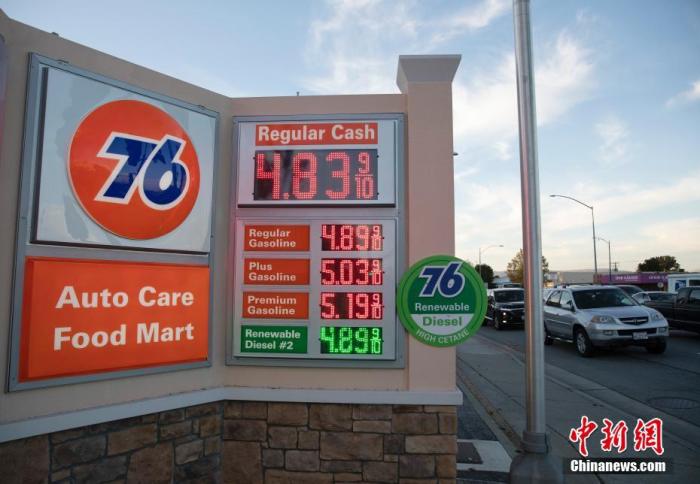Chinanews, December 2nd, a comprehensive report, recently, the chairman of the US Federal Reserve Powell said that the Fed needs to be prepared to deal with inflation that may not fade in the second half of 2022 as most people expected.
Data map: On November 16, local time, a car passed by a gas station in San Mateo County, California, USA.
According to data from the American Automobile Association, gasoline prices in California hit a record high that day, and the average price of regular gasoline per gallon soared to $4.687, ranking first among all states in the United States.
This is the third consecutive day that California has broken oil price records.
Photo by China News Agency reporter Liu Guanguan
According to Reuters, Powell reiterated on the second day of the U.S. Congress that he and other policymakers would consider speeding up the Fed’s bond purchase plan at the next meeting, a move widely regarded as opening the door for early interest rate hikes.
The report pointed out that because consumer demand is very strong and supply chain problems persist, the Fed may be close to having to choose between achieving full employment and controlling inflation.
Powell said that he believes that with the restoration of the supply chain, the inflation rate in the second half of 2022 may "significantly" fall, but "the risk of high inflation has risen."
He told the US House of Representatives Financial Services Committee: "We must use our policies to solve a series of plausible results, not just the most likely results."
The Beige Book published by the Federal Reserve showed that the US economy expanded at a moderate to moderate pace in October and the first half of November, while companies were responding to rising inflation and labor shortages.
Soon after Powell and Secretary of the Treasury Yellen attended the congressional hearing, U.S. public health officials announced the first confirmed case of the Omi Keron strain in the United States.
Although lawmakers did not ask how Powell’s Omi Kiron strain might affect the economic outlook or the Fed’s policy response, the President of the Federal Reserve Bank of New York (John Williams) said in an interview with The New York Times that Omi Kiron’s drug Strains may cause a slowdown in economic activity and increase inflationary pressures.
Powell also pointed out on November 30 that the recent increase in the number of confirmed cases of the new crown in the United States and the emergence of the mutant virus Omi Keron strain pose a downside risk to the U.S. economy and employment, as well as increase inflation uncertainty.
He said that greater concerns about the virus may reduce people's willingness to work, which will slow the recovery of the job market and increase the risk of supply chain disruption.
According to Reuters, US consumer confidence fell to a nine-month low in November due to concerns about rising living costs and fatigue from fighting the epidemic.
The Omi Keron strain also brings more uncertainty to families and businesses.
Powell admitted frankly that Fed officials are monitoring the changing economic situation and acknowledged that they may be under pressure to achieve the dual tasks of full employment and price stability.
"When these two goals are under tension, we have to balance them, just like now."

